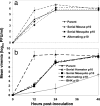Arbovirus evolution in vivo is constrained by host alternation
- PMID: 18458341
- PMCID: PMC2383930
- DOI: 10.1073/pnas.0712130105
Arbovirus evolution in vivo is constrained by host alternation
Abstract
The intrinsic plasticity of RNA viruses can facilitate host range changes that lead to epidemics. However, evolutionary processes promoting cross-species transfers are poorly defined, especially for arthropod-borne viruses (arboviruses). In theory, cross species transfers by arboviruses may be constrained by their alternating infection of disparate hosts, where optimal replication in one host involves a fitness tradeoff for the other. Accordingly, freeing arboviruses from alternate replication via specialization in a single host should accelerate adaptation. This hypothesis has been tested by using cell culture model systems with inconclusive results. Therefore, we tested it using an in vivo system with Venezuelan equine encephalitis virus (VEEV), an emerging alphavirus of the Americas. VEEV serially passaged in mosquitoes exhibited increased mosquito infectivity and vertebrate-specialized strains produced higher viremias. Conversely, alternately passaged VEEV experienced no detectable fitness gains in either host. These results suggest that arbovirus adaptation and evolution is limited by obligate host alternation and predict that arboviral emergence via host range changes may be less frequent than that of single host animal RNA viruses.
Conflict of interest statement
The authors declare no conflict of interest.
Figures


References
-
- Domingo E, Holland JJ. RNA virus mutations and fitness for survival. Annu Rev Microbiol. 1997;51:151–178. - PubMed
-
- Gao F, et al. Origin of HIV-1 in the chimpanzee Pan troglodytes troglodytes. Nature. 1999;397:436–441. - PubMed
-
- Guan Y, et al. Isolation and characterization of viruses related to the SARS coronavirus from animals in southern China. Science. 2003;302:276–278. - PubMed
-
- Marra MA, et al. The Genome sequence of the SARS-associated coronavirus. Science. 2003;300:1399–1404. - PubMed
Publication types
MeSH terms
Grants and funding
LinkOut - more resources
Full Text Sources
Other Literature Sources

